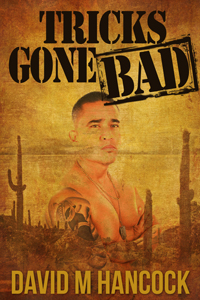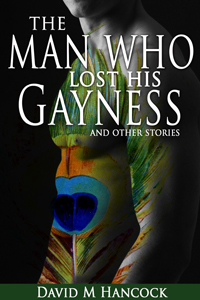I am the author of the short story collection “The Man Who Lost His Gayness” and an autobiographical novella “Tricks Gone Bad.” My biography on my Amazon author page discusses some of the influences that have steered my writing choices. In a nutshell: Sex and magic!
I wrote an essay about why I wanted to write about sex and cruising and seamy episodes from my life. I’m not exactly sure where it all comes from, or why. But I know I wanted to write about sex from outside the mainstream, monogamous view. I wanted to cop to things that nice people don’t own up to. I wanted to be audacious. It was important to me to write fearlessly. And not worry about what people would think.
In the late 1970s, the playwright Tennessee Williams gave an interview to Playboy. He was asked what advice he would give to young writers. I remember his answer, because I wrote it down in my journal: “I hope he follows his heart, baby. His poor frightened heart.”

In 2014, I collected my short stories of the last 10 years in a debut ebook, which I brought out in print a year later. “The Man Who Lost His Gayness” is a varied mix of genres and styles. Several of the stories are gritty dispatches from the casual sex jungle.
“I Don’t Know Why” details an online hookup where the narrator is suddenly wondering if HIV transmission has occurred. It’s very short; you can read the whole thing for free on the Amazon book preview.
“Far Away, And In Someone Else’s Ass” is a stream of consciousness rendering of a gay rape in a seedy hotel. It won a fiction contest under a different title in 2005.
“Buying It” is a meditation on the options for an older man who still craves physical beauty.
Several of the stories reflect my life as a gay man coming of age in the shadow of HIV/AIDS. HIV has been a black raven perched on my left shoulder as I walk through life. HIV is the blurry monocle through which I examine a potential partner. My stories, cloaked in magic and metaphor, reflect my twisted relationship with HIV. I wrote an essay on this theme for POZ.com.
One of my favorite stories is “Jinetero: A Cuban Romance,” which was based on a trip I took to Havana in 1991 while a reporter for The Miami Herald. After several years of inhaling the second-hand smoke of Cuban exiles’ nostalgia for the island, I was able to get around the diplomatic barriers between the U.S. and Cuba and see it for myself. What I found was a society frozen in amber — “an enchanted kingdom living under a spell of ideological poverty.” I made friends with a young Cuban man which was a secret I kept for decades, until I wrote about it for the Miami New Times.
Some of the other stories in “The Man Who Lost His Gayness” reflect my love of magic and fantasy. “The Unnatural Sister” is set in a world like our own where people are ignoring the strange things happening all around them. “Gypsy Prince Of The Steam Room” is a humorous take on longing for unavailable beauty.
My collection concludes with a novella “The Prodigal Prince,” an adult fairy tale that includes every gay archetype in the canon. A young man fleeing the pressure to conform, a domineering mother and an indifferent father, a selfish hedonist, a forbidden romance in the shadows, a treacherous closet queen – they’re all here. Throw in a grandmother who knows some magic, a quartz pendant conducive to visions, several murders and you have the rollicking adventure of a young prince who definitely does not want to be king.
In 2015, I brought forth “Tricks Gone Bad,” an autobiographical novella that deals with a real-life blackmail situation I went through in the 1980s. The novel also looks at risky behavior, the suspension of possible consequences that takes place when having sex with a stranger.

“Tricks Gone Bad” begins with a young reporter in El Paso, Texas, covering the story of gay hookup that ended in murder in neighboring Ciudad Juarez. Soon after, the reporter “David” has his own trick go bad when he meets a handsome young parolee and invites him home for an idyllic afternoon. Move forward three days and David is at work when he learns his house has been burglarized by his new paramour and a buddy. What follows is a series of threats and blackmail from the burglars and their legal team. It’s an “Oscar Wilde” scenario, where David worries that his indiscretion will be written up — if it goes to trial — by the competing newspaper. He’ll be disgraced and possibly lose his job. It’s Texas, after all, in the 1980s.
The novel skips forward in time to other episodes in David’s life that go south — abysmal antics one and all, which is the name of my publishing imprint — including a messed-up drug run with a Miami Beach go-go boy and an encounter in NYC where David wonders if he’s going to have to stab a new acquaintance who turns nasty.
David’s mishaps occur amidst a career as a breaking news reporter. The line gets blurry over which activity is giving him more of a rush — deadline reporting or cruising.
Here is the opening of “Tricks Gone Bad.”
EL PASO, 1985 – David is on the phone with the Chihuahua state judicial chief, an oily, odious man who makes David nervous. The chief is undoubtedly corrupt; the type of taunting public official who will sneeringly serve up an unlikely version of events and then pause to gauge whether the reporters are going with it. Not that he doesn’t provide valuable information. But like an onion, the chief must be peeled back by careful questions which rarely come from the Mexican press.
The chief is giving David the latest on a missing El Paso man. It’s a typically poor connection with Mexico and David is having to shout his questions in Spanish. It was funny at first, but now the copy editors sigh and roll their eyes. Why doesn’t he just open the window and yell, says one. They might hear him better.
It’s a little past 7 p.m. and there’s enough time to get something in the state edition. It’s a juicy scoop that will rankle David’s competitor at the afternoon paper, which won’t go to print until noon the next day. El Paso police will also be annoyed that he’s gotten the information directly from the Mexicans before they can sanitize it.
Fuck ’em all!
As David shouts and takes frantic notes at his cluttered desk, the fluorescent-lit newsroom bustles with the organized chaos of a newspaper revving up to print. In a crescendo rising to meet each of the evening deadlines, photographers will argue passionately for artistic display of their shots as content editors confer nervously with their laboring writers. All competing for inches in the news hole divvied up by harried copy editors wielding pica poles and measuring wheels. The orchestral hum will grow in intensity until the building itself vibrates with the rolling of the presses.
Over the sputtering line, the chief is taking unusual relish in sharing the sad details told to detectives by a young man they arrested that afternoon. David wonders how they got such a thorough confession from the man in such a short span. But that’s a question for another day.
The victim is an American businessman who has been missing for several days. According to the “vagrant’s” story, the businessman picked him up at the downtown public library in El Paso. They drove in the man’s van back across the border to an isolated picnic site in the Chihuahua desert west of Juarez, where they drank beer and smoked weed.
The chief seems a little drunk or hopped up. He sensuously describes how the American businessman sucked the young man’s dick and then allowed himself to be anally fucked. Is this some Mexican imperialism at play? Slipping the Mexican verga to Uncle Sam? Or is he trying to make a point to a U.S. journalist that this degenerate brought it on himself? Mexico is not to blame.
The party in the desert goes downhill. The El Paso man is stabbed several times and run over with his own van. The young Mexican was stopped that afternoon driving the van, and was later persuaded to lead police to the remote campsite where the El Paso man’s body was decomposing.






